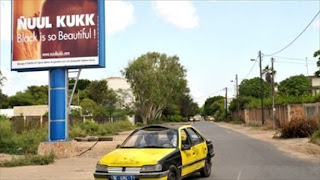By Agence France-Presse
Monday, February 18, 2013 7:20 EST


Topics: Senegal
Outraged by adverts urging women to bleach their skin, a spontaneous movement has emerged in Senegal arguing that black is beautiful — and to act otherwise is to risk one's health.
The campaign sprang up in response to advertisements that appeared in the capital Dakar last year for a cosmetic cream called "Khess Petch", or "all white" in the local Wolof language.
The posters promised "rapid action" and "results in 15 days". They showed before and after pictures of a young woman who started out black and ended up with fair skin through depigmentation, locally known as "kheessal" or bleaching.

"We were scandalised (by a poster) suggesting that black is not beautiful because it recommends that young women should transform themselves in a fortnight," said Aisha Deme, who runs the cultural website Agendakar.com.
"In a spontaneous response, we wanted to elevate the black woman and we launched "Nuul Kukk", which means "all black", the young woman added.
So the campaigners put up their own posters in the Senegalese capital, this time showing a proud black woman. The work was done for free by fashion photographer Stephane Tourne and advertising professionals.
The Nuul Kukk campaign, which is highly active online and has its own website, Twitter feed and Facebook page, features local stars, including the rapper Keyti, the stylist Dior Lo and women's rights activist Kine Fatim Diop.
The campaign is also backed by dermatologist Fatimata Ly, who has been fighting the "kheessal" practice for 10 years as part of the International Association for Information on Artificial Depigmentation.
For Ly, skin-bleaching is a public health concern because "in the general population, 67 in every 100 women practice artificial depigmentation."

These products reduce the body's ability to "defend itself against (various) infections", and they also "have broader effects on health, such as diabetes and high blood pressure," she added.
The skin-lightening phenomenon exists in several sub-Saharan African countries and in the black diaspora. In Senegal, "it is mainly a feminine practice, even if you find it among men in some particular groups, such as performers," Ly said.
Whitening creams, milks and gels contain substances initially intended for therapeutic purposes, such as corticosteroids and hydroquinone, and should only be prescribed by doctors, according to Ly.
"Unfortunately, you can find them all across the Senegalese market. They are products that are very accessible," she said.
At between one euro ($1.3) and 1.5 euros ($2) per product — five or six times cheaper than in a chemist's shop — they are also affordable, Ly said as she showed pictures on her computer of the damage caused by bleaching products, ranging from swollen legs, bruises and open wounds to blemished skin and burns.
Women are nonetheless drawn to the products because they believe they will make them more beautiful, according to researchers and doctors, and Deme says it's an uphill battle to convince women otherwise.
"Today's society imposes criteria for beauty on us… Everybody promotes women with fair skin: the papers, magazines, video clips," said Deme.
"What we recommend today is just to stop depigmentation. We should stop importing these products and selling them, so that there are no more scandalous advertisements," she added. "It will take as much time as it takes, it will be long, but we have to fight."
[Image via Agence France-Presse]
Sent from my BlackBerry wireless device from MTN





















No comments:
Post a Comment